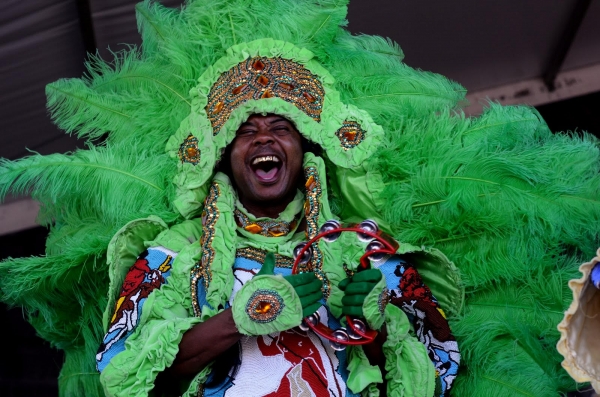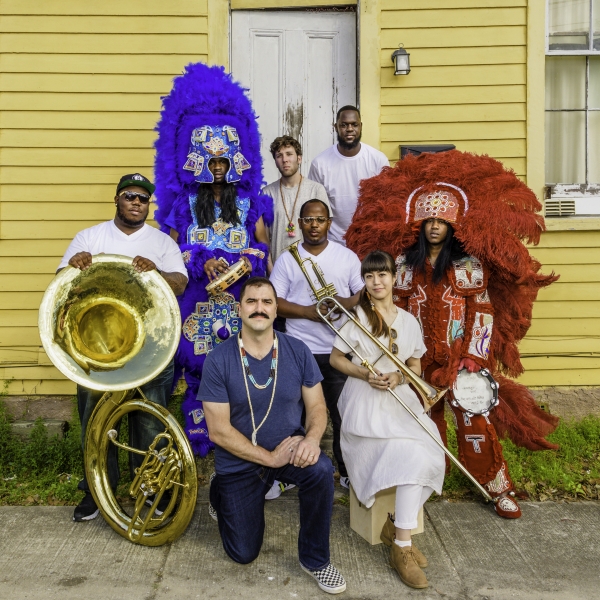Born into the Mardi Gras Indian culture in uptown New Orleans, Cha Wa's lead singer, J'Wan Boudreaux, has lived and breathed street music, pageantry and parades ever since his mother dressed him in his first hand-beaded and feathered parade suit when he was just 2. Even now when he's on break from touring, the 22-year-old can be found playing jazz with brass musicians in a second-line parade on any given Sunday or decked out head-to-toe in full Mardi Gras Indian regalia singing traditional Indian chants as a "spyboy" responsible for leading his grandfather's Golden Eagles tribe through neighborhood streets on Mardi Gras day.
"I'm a Mardi Gras Indian before I'm anything, so when (Cha Wa) is traveling and all that, we make sure we're home for those days like Mardi Gras, Super Sunday and St. Joseph's night" -- all major parade days in the Mardi Gras Indian culture, Boudreaux (pronounced Boodrow) explained to the Weekly by telephone from his New Orleans home. He hasn't missed those parades a single year, he said, providing insight into just how integral a role music and street traditions play in his life.
Cha Wa brings these New Orleans street traditions together in its music by blending second line brass and funk with the soulful chants of the Mardi Gras Indians. On stage, Boudreaux masks Indian -- donning a traditional suit made of brilliantly colored feathers and patterned beads that includes a headdress, chest plate and apron leggings all hand-sewn by Boudreaux for Mardi Gras day. It's a tradition, according to one version about the formation of this secretive society, that started in the 1800s when African-Americans dressed like Native Americans on Mardi Gras and sang chants as homage to the tribes who helped runaway slaves "mask" or hide.
Today's suits can weigh as much as 100 pounds and take as long as a year to make.
The suit is almost more important than anything else, Boudreaux explained.
"You have to be willing to sew and put in the hours almost every night. It's pretty much like having a job," he said. "My time to sew is pretty much late night until early in the morning."
On tour, he sews while he's in the van or hotel room. It's a skill he learned from observing his grandfather.
"To this day, I'm still learning tricks of the trade," he said.
Having a suit that's better than anyone else's on parade days is "the whole point of the Mardi Gras Indians," he said. It's a competition, he added.
While the band's name, "Cha Wa," is an Indian call used during parades to let other tribes know "we're comin' for ya," the term also could easily describe the band's rapid advance into neighborhoods beyond New Orleans with its second album "Spyboy." Released last April, the album has been nominated for a Grammy Award for Best Regional Roots Music Album, catapulting the band on a whirlwind tour across the country.
Boudreaux said not everyone is familiar with the Indian chants or style of music, but that doesn't matter. Most people have a similar reaction when they hear it: "I don't understand what you're saying, but I ... love it!"
On Friday, Jan. 25, the band is bringing its eclectic street sound to Stanford's Bing Studio as part of the 2018-19 Stanford Live concert season celebrating New Orleans musicians on the city's tricentennial.
Boudreaux, who's still a bit stunned since learning about the band's Grammy nomination last month, said the band wanted to keep the roots of brass and Indian music but do it their own way.
"Everything has to elevate at one point in time," he said. "We're still stickin' to the roots, but we're going somewhere else ... and we're not the first ones to do it."
Mardi Gras Indians, including his grandfather, Big Chief Monk Boudreaux -- a descendant of Native Americans and African slaves, who leads the Golden Eagles tribe -- initially helped push the music's boundaries generations earlier with the Wild Magnolias, giving many of the traditional songs new life.
For Cha Wa, whose members come from both the brass and Indian worlds and who played together in the streets before joining the band, creating their own sound just seemed to come together.
"All the souls got involved in the music. ... Everybody just started putting their instruments together and adding their own touch," Boudreaux said.
The result is a new generation of classic and newly written songs that radiate the fiery energy of New Orleans' street music.
On "Spyboy," Cha Wa (whose members include founder and drummer Joe Gelini, Clifton "Spug" Smith, Spyboy Thaddeus "Peanut" Ramsey, Ari Teitel, Eric Gordon Jr., Joseph "Jose" Maize Jr., Haruka Kikuchi and Boudreaux) collaborated with some of the biggest names in the Indian and brass worlds, including Galactic's Ben Ellman, who produced the album, and Big Chief Monk Boudreaux, who was a guest on two songs.
The younger Boudreaux, who has performed with his grandfather occasionally, had never recorded with him in the studio until now.
"It was a great experience because out of all the CDs he made, I never was in the studio with him. For it to be visa versa, him in the studio on my CD ... especially for him to still be around and able to be a part of it ... is great."
As frontman of Cha Wa, Boudreaux said he hopes to carry on the music and traditions of his culture to a new generation. (He's already getting ready to include his daughter in her first Mardi Gras parade this March, which falls just one day before she reaches 6 months old.)
Boudreaux said he wasn't always a frontman, or even a good singer. He said while in high school, he would occasionally sing background and ad lib with musicians that toured with his grandfather. When one of the lead singers quit, they told him:
"You got to step up or step back," he said. "It came in me, and I just started rolling from there."
Music and the Mardi Gras Indian culture, "is pretty much everything I know." Boudreaux said. "This is what I want to do, and I still have a lot more life to go."
What: Cha Wa.
Where: Bing Studio, 327 Lasuen St., Stanford.
When: Friday, Jan. 25, at 7 p.m. & 9 p.m.
Cost: $25 general/$10 Stanford students.
Info: Go to Stanford Live.




Comments